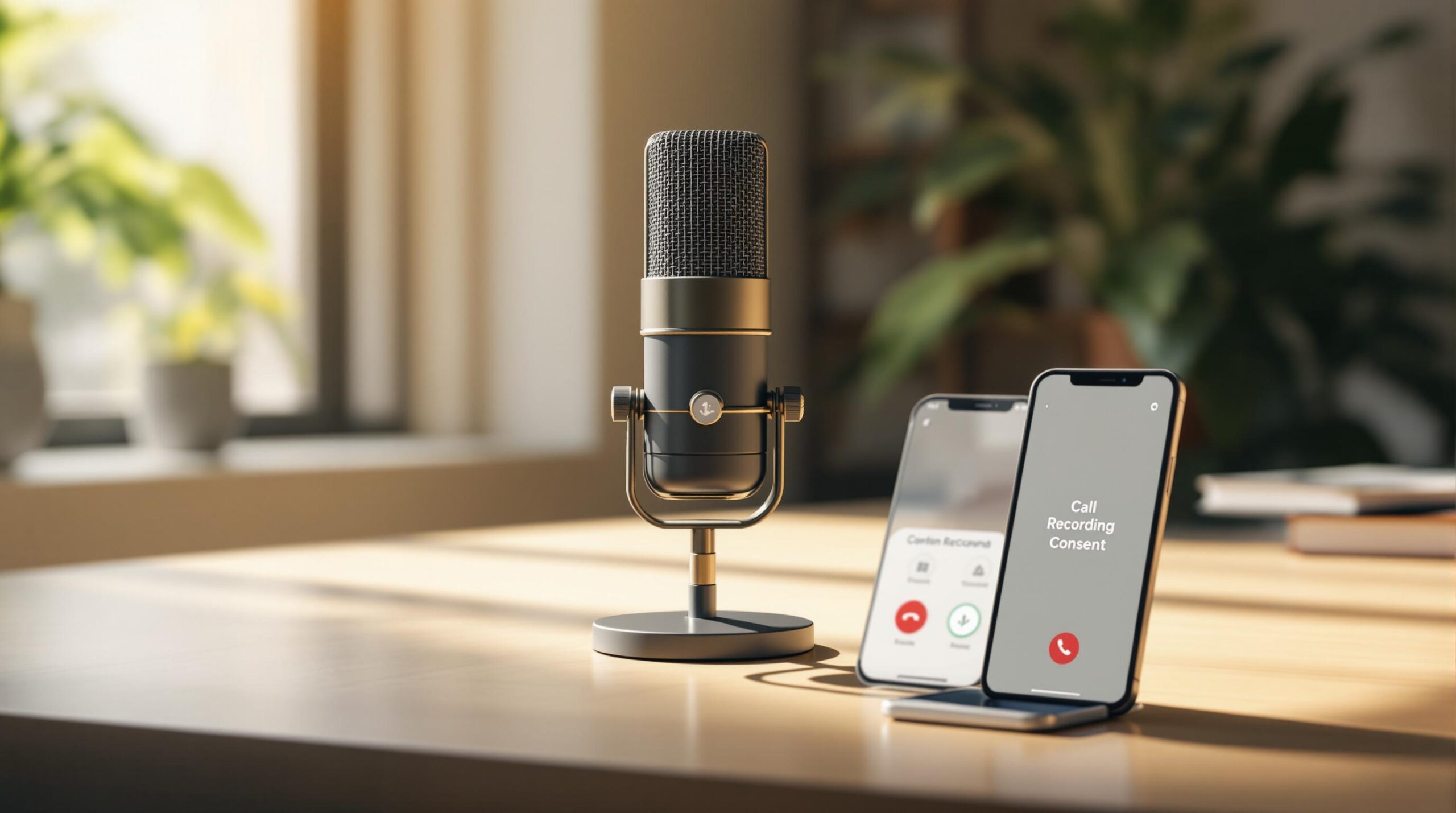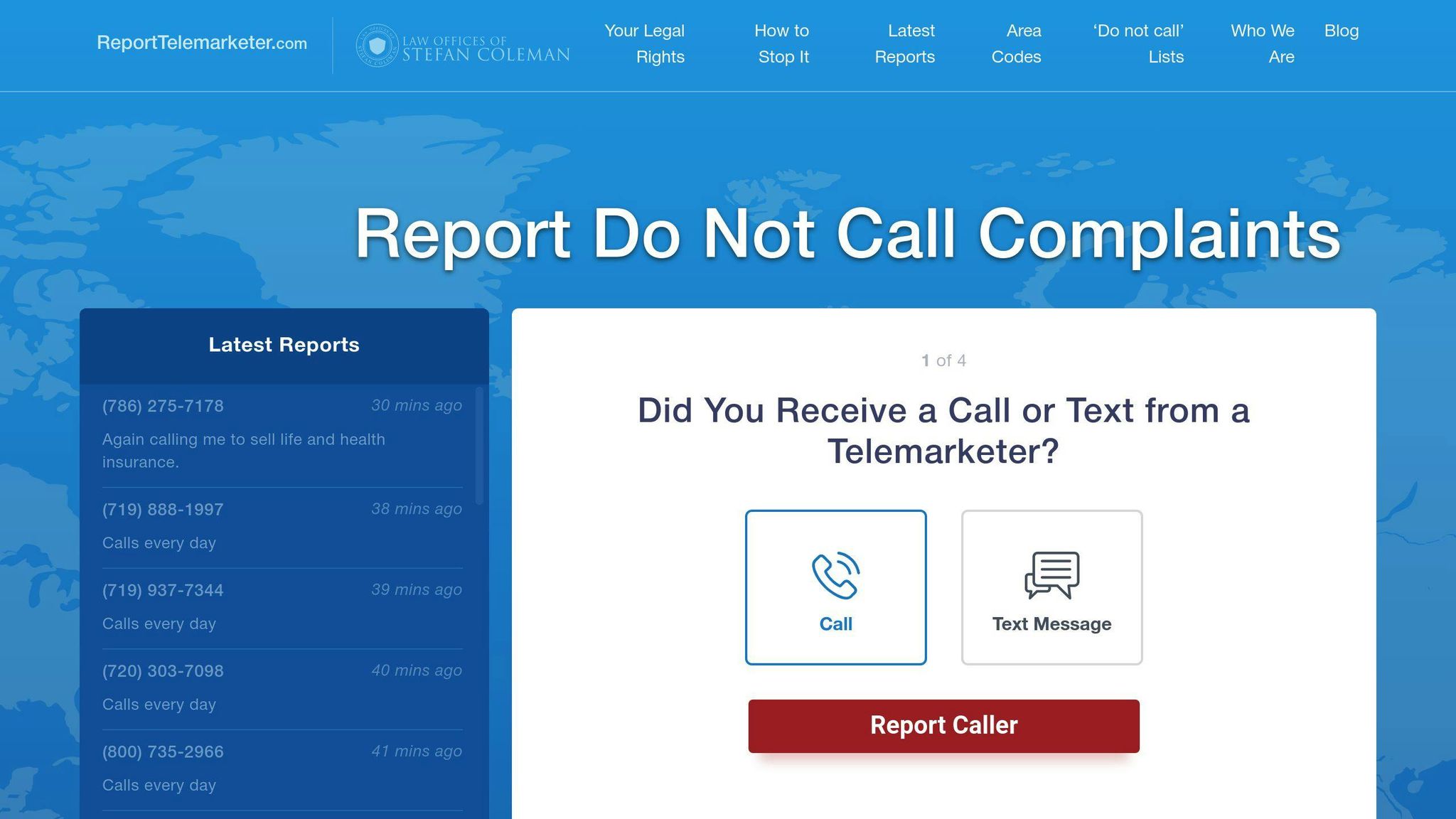
Call recording consent laws protect your privacy by regulating how and when calls can be recorded. Here’s what you need to know:
- Federal Law: Requires one-party consent – only one person on the call needs to agree to the recording.
- State Laws: Some states, like California, Florida, and Illinois, require all-party consent, meaning everyone on the call must agree.
- Types of Consent: Consent can be express (clear agreement) or implied (staying on the call after notification).
- Your Rights: You have the right to be informed, request access to recordings, and take action if your privacy is violated.
For businesses, following stricter all-party consent rules is often the safest route to avoid fines or lawsuits. Always check your state laws to ensure compliance.
| Consent Type | Requirement | Applicable Jurisdiction |
|---|---|---|
| Federal One-Party | One participant must give consent | Federal law and states without specific rules |
| State All-Party | Everyone on the call must agree | States with stricter regulations |
| Third-Party Recording | At least one participant must consent | Illegal without participant consent |
Understanding these laws helps you protect your rights and privacy. Read on for more details about ensuring compliance and resolving disputes.
Call Recording and Dual Party Consent
Understanding Call Recording Laws
Call recording laws in the United States are a mix of federal and state regulations. They determine how and when conversations can be recorded, while also safeguarding privacy.
Federal and State Call Recording Laws
Under federal law, one-party consent is enough. This means anyone involved in the conversation can record it without informing others. However, if the call crosses state lines, stricter state laws may apply. To stay on the safe side, following all-party consent rules is often the best approach.
| Consent Type | Requirements | Applicable Jurisdiction |
|---|---|---|
| Federal One-Party | One participant must give consent | Federal law and states without specific rules |
| State All-Party | Everyone on the call must agree | States with stricter regulations |
| Third-Party Recording | At least one participant must consent | Federal law – illegal without participant consent |
While federal rules provide a baseline, many states have additional requirements that demand compliance with stricter standards.
States Requiring All-Party Consent
Some states have adopted "all-party consent" laws, which require everyone on the call to be informed and agree to the recording. These states include:
- California
- Florida
- Illinois
- Pennsylvania
- Connecticut
- Michigan
- Montana
In these states, everyone on the call must give their consent. These rules apply to both personal and business calls, making it essential to follow them to avoid legal issues.
For businesses, operating across state lines means adhering to all-party consent is often the safest route. Ignoring these laws can lead to serious consequences, including costly lawsuits and uncapped damages. Businesses must also notify participants, document their consent, securely store recordings, and control access to comply with these regulations.
For individuals, understanding these laws is key to protecting your privacy. If you believe your rights have been violated, platforms like ReportTelemarketer.com can help you address unauthorized recordings. These laws empower consumers to take action and ensure their conversations remain private.
Types of Consent for Call Recording
Express vs. Implied Consent
Call recording consent generally falls into two categories: express and implied. Both are important for ensuring compliance and protecting the rights of individuals and businesses.
Express consent involves a clear, explicit agreement from everyone on the call. This can be verbal or written. For instance, when you call a customer service line and hear, "This call may be recorded for quality and training purposes. Do you agree to continue?", the company is asking for express consent.
Implied consent happens when someone stays on the call after being informed that it’s being recorded. While it’s less formal than express consent, it still hinges on clear notification being provided.
| Consent Type | Definition | Legal Importance |
|---|---|---|
| Express | Explicit verbal or written agreement | Offers the strongest legal backing |
| Implied | Consent inferred from continued participation | Riskier in states with stricter consent laws |
| Written | Signed or documented agreement before the call | Provides solid proof of consent |
Ways to Obtain Consent
There are different ways to ensure consent is obtained for call recording:
- Verbal Notification: A straightforward announcement at the start of the call, letting everyone know the call will be recorded.
- Beep Tones: Periodic beeps during the call serve as a reminder that recording is taking place. These tones are commonly used in customer service settings and are required to occur consistently to meet legal standards.
In industries like healthcare or finance, where sensitive information is discussed, businesses often prioritize express consent to avoid legal challenges and comply with stricter regulations.
Being aware of these consent types can help consumers safeguard their rights and address any disputes over recordings.
sbb-itb-a8d93e1
Consumer Rights in Call Recording Disputes
When issues arise involving recorded calls, consumers are protected by specific laws designed to safeguard their interests. Knowing these rights can help resolve conflicts and maintain privacy.
Accessing Recorded Calls
Consumers have the right to request access to recorded calls, especially in disputes involving telemarketing or debt collection. To make such a request, reach out to the company, provide details about the call, confirm your identity, and specify how you’d like to receive the recording. State and federal laws require companies to honor these requests.
Having access to these recordings allows consumers to check if consent laws were followed and can strengthen their case in a dispute.
| Request Type | Response Time | Common Requirements |
|---|---|---|
| Standard Request | 30 days | Written request, ID verification |
ReportTelemarketer.com: Reporting Violations

ReportTelemarketer.com is a resource for consumers to report illegal telemarketing activities, investigate potential violations, and take action. This includes filing complaints and seeking compensation for damages.
Evidence Requirements: To use recordings as evidence, they must be legally obtained, clearly audible, securely stored, and properly documented. Courts also require proof of who managed the recording to ensure its validity.
Knowing your rights is just the beginning – understanding how to verify consent and handle disputes effectively is the next step.
Steps to Verify Consent and Resolve Disputes
Verifying Legal Consent
Ensuring legal consent for call recording involves paying attention to specific notification details. The Electronic Communications Privacy Act (ECPA) outlines what qualifies as proper consent. When reviewing a recorded call, confirm these key points:
| Consent Element | How to Verify | Legal Requirement |
|---|---|---|
| Clear Notification | Listen to the audio | Notification must occur before recording starts |
| Purpose Statement | Review the content | Must explain why the recording is being made |
| Consent Verification | Check the response | Ensure understanding and agreement are confirmed |
After verifying consent, it’s crucial to document it thoroughly to safeguard your rights in case of future disputes.
Documenting Consent for Legal Protection
Keeping detailed records is vital for handling disputes effectively. Ensure you maintain:
- Emails, screenshots, or chat logs confirming consent for recording.
- Call details, including date, time, duration, and representative information.
- Copies of written agreements or notices about recording policies.
- Both digital and physical backups of consent-related documents.
Use password-protected cloud storage to keep these records secure and accessible. This is especially important in states requiring all-party consent, where violations can result in serious legal issues.
Platforms like ReportTelemarketer.com can help investigate potential violations and organize evidence of unauthorized recordings. Their tools make it easier to build strong cases by documenting every aspect of recording practices.
Conclusion and Key Points
Informing Consumers
Knowing call recording consent laws is essential for safeguarding your privacy. The Electronic Communications Privacy Act (ECPA) provides a federal framework, but state laws differ widely. Some states require consent from all parties, while others only need one party’s consent.
To ensure you’re protected, check if you’re being recorded and understand your rights:
| Aspect | Consumer Rights | Legal Requirements |
|---|---|---|
| Notification | Right to be informed before recording | Clear disclosure of recording purpose |
| Access | Right to request copies of recordings | Businesses must securely maintain records |
| Consent Type | Dependent on state laws | Express or implied consent based on location |
Familiarizing yourself with these legal details is just the beginning. Knowing how to respond to violations is equally critical.
Compliance and Consumer Assistance Tools
Both consumers and businesses need to take actionable steps to ensure compliance and address any breaches effectively. Tools like ReportTelemarketer.com can assist consumers by investigating violations and pursuing legal remedies, such as filing formal complaints or cease-and-desist letters.
For businesses managing call recordings, compliance involves:
- Providing clear notification before recording starts.
- Securing appropriate consent based on state-specific laws.
- Storing recordings with detailed information, like timestamps, to meet legal standards.
- Ensuring safe and secure storage of all recordings.
Properly verifying and documenting consent is essential to protect your rights. Recordings are only valid in court if consent was obtained and documented correctly. Stay informed about your state’s laws and seek help if your rights are infringed.